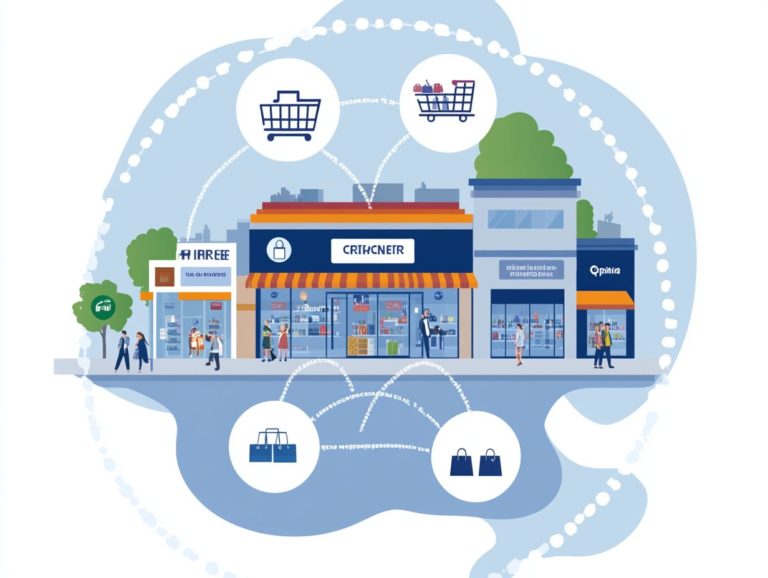28. 10 Advantages of CRM for Insurance Brokers
In today s fast-paced insurance industry, staying ahead of the competition involves more than just expertise; it calls for efficient tools and strategies.
Customer Relationship Management (CRM) systems have become essential tools for insurance brokers, making things easier and enhancing client interactions.
This article delves into ten key advantages of CRM specifically tailored for insurance brokers, ranging from improved customer service to superior data management.
See how adopting a CRM can transform your business today!
Contents
- Key Takeaways:
- 1. Streamlines the Sales Process
- 2. Improves Customer Service
- 3. Increases Efficiency
- 4. Provides Better Data Management
- 5. Allows for Targeted Marketing
- 6. Helps with Lead Generation
- 7. Facilitates Cross-Selling and Up-Selling
- 8. Improves Communication and Collaboration
- 9. Enables Better Reporting and Analytics
- 10. Enhances Customer Retention
- What Is CRM and How Does It Work for Insurance Brokers?
- What Are the Key Features of CRM for Insurance Brokers?
- How Can CRM Help with Compliance and Regulations?
- What Are the Potential Challenges of Implementing CRM for Insurance Brokers?
- How Can Insurance Brokers Choose the Right CRM System?
- What Are the Long-Term Benefits of Using CRM for Insurance Brokers?
- Frequently Asked Questions
- What is CRM for Insurance Brokers?
- What are the key advantages of using CRM for insurance brokers?
- How can CRM benefit insurance brokers in terms of customer service?
- How does CRM improve efficiency and productivity for insurance brokers?
- Can CRM help insurance brokers increase their sales and revenue?
- Is CRM suitable for all types of insurance brokers?
- How can CRM help insurance brokers save costs and achieve a higher return on investment?
Key Takeaways:

CRM streamlines the sales process for insurance brokers! It makes tracking leads and closing deals easier.
By improving customer service, CRM ensures that insurance brokers can better meet the needs of their clients and build stronger relationships.
With CRM, insurance brokers can increase efficiency and productivity by automating tasks and eliminating manual processes.
1. Streamlines the Sales Process
The implementation of insurance CRM systems is transforming how you, as an insurance agent or broker, streamline your sales processes.
This technology ensures a more efficient journey through the sales pipeline. It also enhances your client management and engagement.
By automating routine tasks like lead tracking, follow-up reminders, and data entry, these systems give you back valuable time to focus on what truly matters: building meaningful relationships with your clients.
Enhanced communication history features allow you to quickly access prior interactions, ensuring that every client meeting is personalized and informed.
You can also analyze client data and sales performance, which not only helps you hit your targets but also drives strategic decisions that can significantly boost your revenue growth.
This newfound efficiency leads to a more satisfying client experience, fostering stronger loyalty and trust in the competitive insurance market.
2. Improves Customer Service
Insurance CRM elevates your customer service game by equipping agents and brokers with a detailed view of client interactions, ultimately enhancing customer satisfaction and loyalty.
This powerful system streamlines communication and helps you track key performance metrics, such as response times and customer feedback.
For instance, by leveraging data analytics, you can spot trends in customer needs and preferences, enabling you to tailor policies and deliver personalized solutions with finesse.
A particularly effective strategy involves segmenting customers based on their claims history and adjusting service offerings to match.
This targeted approach not only addresses individual client concerns but also cultivates a stronger relationship, ensuring your customers feel valued and understood.
3. Increases Efficiency
By automating many tasks, insurance CRM systems reduce your workload. This allows you to focus on more significant client management activities throughout the sales process.
These systems often include automated follow-up actions, ensuring that no lead slips through the cracks while streamlining workflow management among your teams.
They significantly cut down the time you spend on routine tasks like data entry and scheduling, freeing you from the productivity drain that can often stifle your progress.
With real-time analytics and customizable dashboards at your fingertips, you can make informed decisions swiftly, enhancing your ability to provide personalized services to your clients.
Automated communication tools also refine the process, resulting in quicker response times and heightened client satisfaction.
4. Provides Better Data Management
Effective data management serves as the backbone of successful insurance CRM solutions, enabling you to maintain comprehensive customer profiles while effortlessly tracking insurance policies and client behavior.
This organized strategy not only enhances your interactions with clients but also enables you to respond swiftly to inquiries, cultivating a more personalized experience tailored to each individual’s needs.
By streamlining policy tracking, you gain quick access to essential information that informs your decision-making processes.
This capability allows you to formulate informed strategies that can adapt to market shifts, ultimately propelling your business growth.
When you leverage accurate data effectively, you unlock the potential to build lasting relationships and elevate operational efficiency, which proves invaluable in today s competitive landscape.
Ready to elevate your insurance business? Start exploring CRM options now!
5. Allows for Targeted Marketing
Insurance CRM boosts your marketing by tapping into customer profiles. This helps you create personalized marketing materials that resonate with your audience.
Engaging prospects through ongoing email series and SMS outreach allows for meaningful connections. Detailed insights into customer behavior help tailor your messaging to specific segments.
A case study showed that a firm using targeted marketing through their CRM saw a 40% increase in engagement. This led to a 25% rise in conversion rates.
Statistical data shows that companies adopting personalized communication witness open rates soaring to nearly 50%. This demonstrates how a well-crafted message can attract potential clients.
This personalized approach generates interest and builds long-term relationships, driving sales growth.
6. Helps with Lead Generation

A strong insurance CRM system is vital for lead generation. It streamlines lead management and enables effective nurturing strategies that identify client opportunities.
These tools automate routine tasks and use analytics to forecast sales trends. Tracking lead engagement helps prioritize high-value leads and customize outreach efforts.
With data-driven insights, you can refine your marketing strategies for a more personalized experience. This approach boosts conversion rates and fosters lasting relationships with clients.
7. Facilitates Cross-Selling and Up-Selling
Insurance CRM systems excel in cross-selling and up-selling. They provide agents with insights into existing client management and potential additional services.
By analyzing customer data, these systems help identify coverage gaps. For instance, if a homeowner has valuable art, you can recommend an appropriate insurance policy.
This proactive approach increases client satisfaction and revenue for your company. Successful firms often use automated reminders for client anniversaries, prompting timely conversations about additional services.
8. Improves Communication and Collaboration
Insurance CRM enhances communication and collaboration among agents. It maintains a comprehensive communication history, improving client interactions.
Easy access to client information enables clear and confident responses to inquiries. Tools like local presence dialing foster a friendly connection with clients.
Collaborative features, such as shared notes, allow teams to work together efficiently. This leads to better problem-solving and quicker response times.
These advancements create a smoother workflow, boosting client satisfaction and loyalty.
9. Enables Better Reporting and Analytics
Insurance CRM systems elevate your reporting and analytics capabilities. With these advanced tools, you gain access to essential performance metrics and insights for informed strategic decision-making and optimized operations.
By leveraging these robust systems, you can track key performance indicators and uncover trends that may not be immediately visible. This data management is crucial for success, allowing your organization to generate actionable reports that highlight areas ripe for improvement.
The power of analytics goes beyond internal processes; it also enhances your customer relationships. By analyzing customer behavior and preferences, you can tailor your offerings effectively, leading to improved sales processes and deeper connections with your clients.
10. Enhances Customer Retention
By improving client management and making timely follow-ups easier, insurance CRM systems play a key role in boosting customer retention and satisfaction.
These systems streamline communication, making it simple to track interactions and understand client needs as they evolve. With features like automated reminders for policy renewals and personalized messaging, you can ensure that your clients feel valued and prioritized.
Using data analytics provides deeper insights into customer behavior, allowing you to create tailored solutions that resonate with each individual. This proactive engagement fosters loyalty and transforms satisfied clients into long-term advocates who stick around and refer others to your business.
What Is CRM and How Does It Work for Insurance Brokers?
CRM, or Customer Relationship Management, is an essential tool for insurance brokers that streamlines your sales process and enhances client interactions. It helps you manage customer relationships comprehensively.
This system allows you to keep careful records of client communications, track policy renewals, manage claims efficiently, and tailor your marketing efforts to meet individual client needs. By centralizing important information, CRM enables you to deliver personalized services, significantly boosting customer satisfaction and loyalty.
For example, platforms like Ringy offer features specifically designed for insurance professionals, such as automated follow-ups and reminders for policy updates. Meanwhile, Salesforce Financial Services Cloud provides robust analytics tools and integrations to better understand your client base.
These functionalities empower you to make informed decisions, enhancing your relationship management efforts.
What Are the Key Features of CRM for Insurance Brokers?

Key features of CRM systems designed for insurance brokers include:
- Automation capabilities
- Lead management tools
- A comprehensive communication history
These features often come with customizable email templates, allowing you to send targeted communications effortlessly, enhancing engagement with potential clients.
Integrated SMS marketing services let you reach out at just the right time, ensuring that crucial updates and reminders reach your clients instantly.
To top it off, robust performance metrics provide insightful analytics, helping you assess your strategies, track client interactions, and refine your approach to build stronger client relationships over time.
How Can CRM Help with Compliance and Regulations?
CRM systems are invaluable for insurance brokers, helping you maintain compliance with industry regulations through effective data management and secure storage of customer profiles.
By streamlining the tracking of customer interactions and ensuring that all communication is carefully documented, these systems play a vital role in adhering to regulatory standards.
For example, with features like automated reminders for policy renewals and compliance deadlines, you can avoid potential pitfalls from overlooked obligations.
Advanced reporting functionalities provide real-time audits, ensuring that all your practices align with legal requirements.
Ultimately, leveraging a robust CRM strengthens your ability to demonstrate compliance, fostering trust with clients and regulators alike.
What Are the Potential Challenges of Implementing CRM for Insurance Brokers?
Implementing a CRM system for insurance brokers can present challenges, such as user experience hurdles and the need for easy connection with existing systems. You might also face pushback from team members who are reluctant to embrace new technology, fearing it could disrupt their established workflows.
To navigate these obstacles effectively, involve all stakeholders from the very beginning. This approach fosters a sense of ownership and encourages acceptance of the new system. Facilitating comprehensive training sessions will help ensure that your employees feel confident and skilled in using the new CRM.
By adopting a phased implementation strategy, you can gradually ease your team into the new system. This allows for adjustments along the way and minimizes the risk of overwhelming staff with sudden changes.
How Can Insurance Brokers Choose the Right CRM System?
Choosing the right CRM system for your insurance brokerage requires examining specific features, integration capabilities, and the overall user experience to meet the unique demands of your operations. This decision is crucial; the right CRM can streamline your workflows, enhance client interactions, and drive impressive business growth!
Consider various criteria, such as:
- The ability to customize workflows.
- Access to analytics for well-informed choices.
- Easy connection with your existing tools.
The CRM must also support scalability to grow with your business and provide training resources to empower your team. By aligning these features with your client management strategies, you can boost your efficiency, better serve your clients, and nurture lasting relationships built on trust and responsiveness.
What Are the Long-Term Benefits of Using CRM for Insurance Brokers?
The long-term benefits of using a CRM system for insurance brokers are significant, leading to sustained business growth, enhanced customer satisfaction, and a deeper understanding of client behavior and needs.
By streamlining processes and putting all client information together on a single platform, a well-implemented CRM allows you to respond quickly to inquiries and tailor your services for each client.
This adaptability builds stronger relationships, making clients feel valued and understood. You can analyze trends to spot opportunities for upselling or cross-selling, effectively maximizing your sales potential.
Ultimately, these enhancements cultivate a loyal client base and contribute to a more organized and efficient operational framework, giving you a competitive edge in an ever-evolving market.
Frequently Asked Questions
What is CRM for Insurance Brokers?

CRM stands for Customer Relationship Management. It helps insurance brokers manage customer interactions and data efficiently.
What are the key advantages of using CRM for insurance brokers?
- Improved customer service.
- Boosted efficiency.
- Better data organization.
- Increased sales and revenue.
- Targeted marketing strategies.
- Streamlined communication with clients.
- Detailed reporting and analytics.
- Automation of routine tasks.
- Integration with other systems and tools.
- Cost savings and higher ROI.
How can CRM benefit insurance brokers in terms of customer service?
CRM allows insurance brokers to have a comprehensive view of their customers, including their history and preferences. This ability enables personalized and timely service, leading to improved customer satisfaction and loyalty.
How does CRM improve efficiency and productivity for insurance brokers?
CRM eliminates the need for manual data entry and tracking, reducing errors and saving time. It also automates routine tasks and provides a centralized platform for managing customer data, making it easier for brokers to access and utilize the information they need.
Ready to transform your brokerage? Start exploring CRM options today!
Can CRM help insurance brokers increase their sales and revenue?
Absolutely! CRM offers valuable insights into customer behavior, allowing brokers to tailor their marketing strategies effectively.
This targeted approach can lead to a significant boost in sales and revenue for insurance brokers.
Is CRM suitable for all types of insurance brokers?
Yes! CRM is highly customizable to meet the specific needs of various insurance brokers.
Whether you specialize in life, health, or any other type of insurance, CRM can adapt to your unique business requirements.
How can CRM help insurance brokers save costs and achieve a higher return on investment?
CRM streamlines processes and improves efficiency, resulting in cost savings and higher returns.
It also reduces marketing expenses and boosts customer retention, which adds to overall savings.






